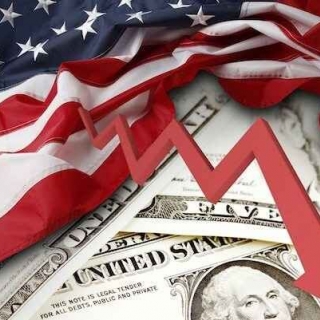


U.S. Treasury yields regained some lost ground on Wednesday after the House of Representatives advanced President Donald Trump's tax-cut agenda, while the dollar and oil prices struggled on mounting worries over the U.S. growth outlook.
U.S. copper prices surged more than 4% while those elsewhere fell overnight after Trump on Tuesday ordered a probe into potential new tariffs on copper imports.
The Republican-controlled U.S. House of Representatives late on Tuesday narrowly passed Trump's $4.5 trillion tax-cut plan, sending the budget resolution to the Senate, where Republicans are expected to take it up.
U.S. Treasury yields advanced on the news as investors anticipate more debt issuance ahead, with the benchmark 10-year yield rising roughly 3 basis points to 4.3271%.
The two-year yield rose 2.7 bps to 4.1229%.
"(The plan) moved through just a little bit quicker than people were expecting," said Tony Sycamore, a market analyst at IG. "You can see the way that yields are moving, it certainly caught them off guard a little bit."
Yields had fallen to their lowest in months in the previous session as traders ramped up bets of more Federal Reserve rate cuts this year, on growing concerns over the outlook for the world's largest economy. [US/]
Data on Tuesday showed U.S. consumer confidence deteriorated at its sharpest pace in 3-1/2 years in February - the latest in a string of surveys suggesting that businesses and consumers were becoming increasingly rattled by the Trump administration's policies.
"We're not surprised that we're getting these weak consumer confidence numbers. What we are surprised about, though, is that we're getting them now, before consumers see the impact of tariffs," said Joseph Capurso, head of international and sustainable economics at Commonwealth Bank of Australia
Fed funds futures now point to nearly 60 basis points worth of easing priced in by year-end, up from about 40 bps a week ago.
That in turn weighed on the dollar, particularly against the yen. The greenback slid to an over four-month low against the Japanese currency in the previous session.
It last traded 0.25% higher at 149.38 yen, thanks to the rebound in U.S. Treasury yields.
In other currencies, the euro eased 0.11% to $1.0502, but was still hovering near a one-month high. Sterling was similarly within striking distance from a two-month top and last bought $1.2651.
"What we're seeing is the dollar weakens because of this soft economic data, but at some point, you hit a threshold where you get safe-haven flows into the U.S. dollar," said CBA's Capurso. "So if things get really, really bad in America, let's say the market starts pricing in a recession or something close to a recession, the U.S. dollar always goes up.
Source: Investing.com
Treasury Secretary Scott Bessent expects a substantial drop in inflation during the first six months of 2026, according to statements made Tuesday on Fox Business. Bessent indicated that an announcem...
US retail sales were little changed in October as a decline at auto dealers and weaker gasoline receipts offset stronger spending in other categories. The value of retail purchases, not adjusted...
US job growth remained sluggish in November and the unemployment rate rose to a four-year high, pointing to a continued cooling in the labor market after a weak October. Nonfarm payrolls increas...
Nonfarm Payrolls (NFP) in the United States rose by 64,000 in November, according to a report from the U.S. Bureau of Labor Statistics (BLS) on Tuesday. This figure was better than market expectations...
Treasury Secretary Scott Bessent said there will be one or two more interviews this week for the next Federal Reserve chairman, with President Donald Trump likely announcing the next chairman sometime...
Gold today tended to move slightly around $4,300/oz as the market "held its breath" after the release of US data and awaited the next trigger. Buyers are still present, but many traders are reducing risk due to the busy week ahead.Fundamentally,...
US President Donald Trump is scheduled to interview Federal Reserve Governor Christopher Waller on Wednesday. The interview is said to be part of the selection process for the top position at the US central bank, according to sources quoted by the...
The Nikkei 225 index weakened slightly by 0.1% to 49,336.22 after losing early gains. This decline followed declines in most US stock markets in the previous session, prompting Japanese investors to remain cautious. US employment data released...
 New York Federal Reserve President John Williams said on Monday the U.S. central bank's interest rate cut last week leaves it in a good position to...
New York Federal Reserve President John Williams said on Monday the U.S. central bank's interest rate cut last week leaves it in a good position to...
 Asian markets opened lower in the last full trading week of 2025, fueled by concerns about the prospects for tech company profits and growing AI...
Asian markets opened lower in the last full trading week of 2025, fueled by concerns about the prospects for tech company profits and growing AI...
 Stocks rose Monday led by a broad array of names as traders bet data set for release this week will point to tame inflation and strong economic...
Stocks rose Monday led by a broad array of names as traders bet data set for release this week will point to tame inflation and strong economic...
 Pasangan mata uang EUR/USD mengawali pekan ini dengan nada sedikit melemah di sesi Asia, diperdagangkan di sekitar 1,1730, turun kurang dari 0,10%...
Pasangan mata uang EUR/USD mengawali pekan ini dengan nada sedikit melemah di sesi Asia, diperdagangkan di sekitar 1,1730, turun kurang dari 0,10%...